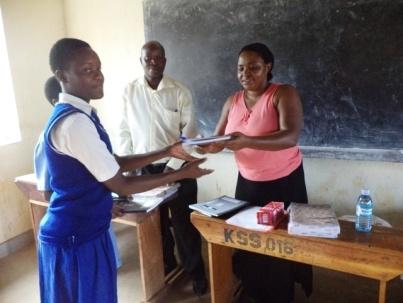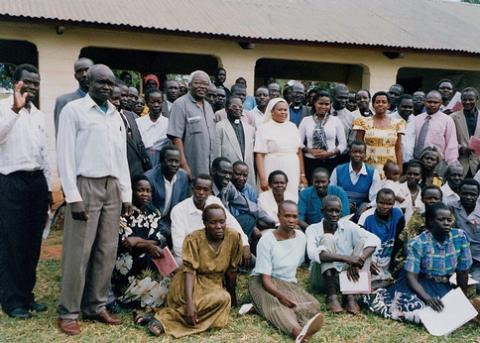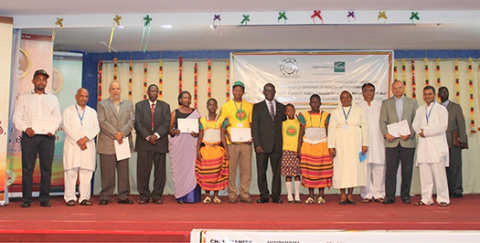The three URI Cooperation Circles featured here are working to improve the quality of life in their communities. Through the collaboration of community members from different faiths and cultural traditions, accessible pathways are created for people to thrive at every level in the community. By contributing to the health of their communities and ensuring that their neighbors’ basic needs are met, these groups are creating a strong foundation for peace.
Acholi Religious Leaders Peace Initiative (ARLPI), Acholi Region, Northern Uganda
Acholi Religious Leaders Peace Initiative formed in 1997 as a proactive response to the conflict in Northern Uganda. Communities in the region faced tragic abductions of children, women, and youth, so the religious leaders of different faiths came together to condemn the abductions. The Cooperation Circle acknowledges that when two or more people or groups with different religious or cultural beliefs live together, disagreements are inevitable. However, this is why interfaith and intercultural bridge-building is so deeply necessary. “It is very important for a community like ours, which has faced so many problems, to stick together for the sake of restoring peace and development.”
Activities and programs since the war have gradually transitioned from reintegration of people into their communities, into peacebuilding and economic livelihood development. The group currently addresses issues of land rights, conflict resolution, and building economic livelihoods. Cooperation Circle members conduct advocacy and conflict resolution dialogues to address post-war land conflicts. The group formed a Village Savings Loan Association to help community members meet scholastic, health, food and other basic needs. An agricultural program trains community members in supporting themselves through raising crops and animals. A health program works against the spread of HIV and AIDS.
“We have established structures in the communities starting from the local or village level councils, cultural leaders, police and others. All these are easily accessed by the community members, and are commonly regarded as alternative dispute resolution mechanisms.”
CLICK HERE TO READ THEIR FULL CC PROFILE
Body and Soul Development CC, Kampala, Uganda
Through religious institutions, religious leaders, and youth leaders, Body and Soul Development Cooperation Circle provides entrepreneurial skills development between different faith groups and communities at the local level. “We call upon members to join hands and work together to contribute to the wellbeing of God’s people. A reward is waiting in heaven. This why Body and Soul Development CC was founded,” says Joy Kemirembe, one of the founding members, of the Cooperation Circle’s purpose. The group’s goals include poverty eradication and spiritual development.
The Cooperation Circle focuses on empowering community members financially through entrepreneurial and job skill training. Some of the group’s activities focus on mushroom growing, bar and liquid soap making, and candle making, with future plans for growing eggplants and peppers to widen the product base for more profits. Because activities are implemented on a cost-sharing model, youths and women with small start-up capital are able to take part successfully. Training activities also cover bookkeeping and business management.
“In an environment where people belong to different religious and cultural backgrounds, interfaith and intercultural bridge building is crucially needed to bring people together for a common cause … when people come together on development causes, their standards of living are improved and harmonious co-existence is realized.”
The Cooperation Circle’s activities have been successful in bringing people of different backgrounds together for a deeper understanding and appreciation of each other’s cultures. In this example, “One member once shared that as a staunch Christian, she used to detest the Islamic faith based on what she called ‘endless visits’ to the toilets. Her problem was the use of the small jerrycans to the toilet, yet according to her knowledge; the same were used for the kitchen. However, once she joined Body and Soul she appreciated the Islamic value of cleaning oneself before talking to God. She also appreciated the practice as a hygienic one as it ensures one’s cleanliness all the time. Today, she understands that it’s better for one to learn about one’s religious values and practices before judging them out of ignorance.”
CLICK HERE TO READ THEIR FULL CC PROFILE
Inter-Religious and Intercultural Dialogue Programme (INTERDIP - UGANDA), Kampala, Uganda
This Cooperation Circle tackles the problem of Uganda’s cultural tensions between indigenous tribes, such as the dominant ethnic tribe Bakonzo, and the Amba peoples, in the Rwenzori region. Because the group members understand that friction between cultures is inevitable, they work to promote inter-religious and intercultural dialogue through the use of art and music. “The formation of such dialogue is driven on the backdrop that new people are always brought on board to introduce them to the inter-religious and intercultural mission.” They are planning training sessions for teachers and student leaders “who shall be equipped with peace building knowledge and skills as well as strategies to engage others on peace building efforts in schools and the communities where they live.”
Since women especially face socio-economic hardships, which puts them at risk for domestic and public abuse, the Cooperation Circle tries to “penetrate the hard barriers among the men-women relationships and families at large to mend relations for peaceful co-existence and harmonious living.” The group also runs programs in schools, universities, primary, and secondary schools, which are geared towards promoting an early life mentoring experience for the upcoming generation to turn away from violent conflict. “The young people are specifically targeted because they are soft spots in the country, who when reached early can be influenced to live peaceful relations among their fellow peers and the general public.”



